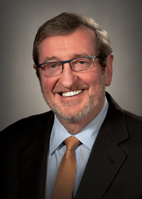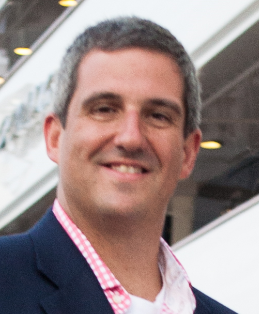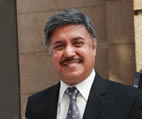
This interview with Michael Dowling, the President and CEO of North-Shore Long Island Jewish Health System, was conducted by Eric Larsen, managing partner, and condensed by Amanda Wolfe, senior director.
Question: You've been here at North Shore-LIJ since 1995, and the path you took to get here is fascinating. If my research is correct, Michael, you have traversed, I think, a half a dozen different professions, including in the engine of a ship ...
Michael Dowling: Right.
Q: Cleaning bars ...
Dowling: Right.
Q: School custodian ...
Dowling: Right.
Q: Dock worker ...
Dowling: Right.
Q: Steel mill worker ...
Dowling: In England.
Q: And then, of course, we're not even talking about your 12-year stint with the government and with insurance. I'd love for you to reflect a bit on your journey.
Dowling: It has been a fascinating journey -- one I would never have fully anticipated. I have been very lucky and quite fortunate.
As a kid growing up in rural Ireland, I had dreams about what could be possible -- about the potential opportunities that lie ahead. I knew, however, that I had to work hard to create those opportunities, and that I had to be optimistic and stay positive. Staying in Ireland, in the circumstances I was in, was not a good option for me.
Q: What was that like, growing up in Ireland?
Dowling: I grew up in Ireland in a completely different world. It is so foreign to most people and foreign to my kids because I grew up in a very impoverished area. We were at the bottom of the ladder. I grew up in a house that had mud floors, mud walls, thatch roof, no electricity and no running water, no bathrooms, no heat—nothing.
People like to forget their past. But I like to be able to keep my feet planted firmly on the ground. It gives perspective and helps me maintain a high degree of humility.
Q: We just ran through all the jobs you've had. You started working at a very young age, right?
I ended up going to England because I was the oldest in the family and had to help out at home. At around 12, I started working in a bottle factory. Then when I was about 16, I went to England and during the summer worked in a steel factory in Crawley, not far from London.
I went to high school in Ireland. Back then, you had to graduate with a certain number of honors to be eligible to even go to college. There were no scholarships, and we had no money. So, I wanted to make sure that at least I got enough honors to be eligible to even think about college, even though, quite frankly, I didn't know what college was. The only person that I knew who had a college degree was a teacher.
I was working in the steel factory in England when I got a letter. I knew it was the letter about my results. I got the honors to get in, which was not easy. I was so excited I remember dancing across the factory floor.
Q: Many of the other CEOs we've spoken with have had some deeply influential people in their lives, helping guide them. Is there mentor or two who have had that disproportionate kind of influence on you along the way?
Dowling: There are a couple of people. Let me preface it by saying that I think every interaction you have with anybody influences you in some way. So, it's not like just only one person. It's understanding that every interaction you have with anybody, including your front-line staff, can influence the way you think about things. So, you've got to look upon the collective as, in many ways, being a mentor.
My mother's focus on education was very, very important. She always said, "Continue your education. Keep getting educated. Keep learning."
And a local farmer also had a major influence on me. I'd come back from England and I had to cross the fields to his house to get milk one night. He had cows. We didn't. And his son at the time was getting ready to go to college. He said, "Isn't it too bad somebody like you will never go to college." I'll never forget that.
Q: He didn't know you very well.
Dowling: No, but it was one of the more positive things ever done [for me]. I'd always wanted to go to college—but now I was actually more determined than ever. Every step on the way back to my house, I told myself: "I'm going to college. I'm going to college."
Being told that you can't do something can be a fabulous motivator. It still is.
The other person who gave me an awful lot of confidence was Mario Cuomo. As governor of the State of New York, he put me into leadership opportunities and gave me responsibilities that I could not even have imagined. He showed faith in me and took a risk.
I spent 12 years in government. I went from being the Deputy Commissioner of Social Services to the Deputy Secretary to the Governor to the Head of Health and Human Services for the state, to Commissioner of Social Services. When you go through those kinds of positions, there is not a lot that you can come up with later in life that you haven't experienced during those times. It's a great training ground.
Branching out from medical delivery to insurance
Q: Let's talk a little strategy. North Shore-LIJ is setting a precedent up here with the establishment of a health plan. I'd love to hear your thoughts on that, particularly in light of some of the national dynamics we've been observing.
Dowling: We're pretty unique as a health system because we're very integrated. We have the full continuum of care, including inpatient, outpatient, home care, hospice and long-term care. We have all of the pieces of the delivery system. But if we are honest about what we've always been doing, we have been in the business of taking care of people after they get sick.
We must transition to being in the business of promoting health as well as expertly taking care of individuals once they become ill. The current fee-for-service method of payment does not align with such a strategy. So we have to move to taking risk for the totality of care for an individual or population. We can enter into multiple-risk arrangements, which we are doing, but having control of the full premium is the best option. Hence, that’s why we started our own insurance company. The opportunity arose to get a license and we took advantage of it.
What I've often said to people is, "If you want to do a job, you have to have all the tools in the toolbox." You can't do the full job if you only have some of the tools in the toolbox. So, if I want to be able to take care of you when you're ill, manage you when you're well and keep you well, I've got to have all the tools. One of the key tools is having global risk or having an insurance company that gives you the whole premium.
To me, we have all the tools in the toolbox now; it opens up the possibility to do a lot of other joint ventures with a lot of other players that we may not have even thought about in the past.
Q: A lot of your peers have shied away from getting into the insurance business. How is operating a health plan different from managing care delivery?
Dowling: I understand that. It's risky, complex and there are no guarantees that you will be successful. We have, however, created a very strong entity and recruited the best talent we could find from the insurance industry. Insurance is very different. It requires a different attitude, a different culture. It is not for the faint-of-heart.
Even in its short history, however, our new health plan has begun to change the whole system. It has become a catalyst that enhances our focus on care management, on utilization, on access and on price.
I believe in leading from the front, in continually moving forward, in constantly being adaptable and in challenging the status quo. How do you know you can't do something unless you try? In fact we should never use the word "can't."
Q: Besides getting into insurance, you're also brokering partnerships, like the one you forged recently with the Cleveland Clinic on cardiac referrals. How did that come about?
Dowling: Well, we started working with Cleveland Clinic a number of years ago on the issue of innovation. I was very aware of the growing trend of big companies selecting certain places [like Cleveland Clinic] for cardiac services.
Q: Like Lowe's and Walmart.
Dowling: Right. So, I'm saying, "Wait a second, we have all of these businesses around here. I don't want to be losing that business." So, Toby [Cosgrove, Cleveland Clinic's CEO] and I talked about it. He was creating this network. I said, "I'd like to be the exclusive player in New York." He sent a team of people here. They spent about six to nine months reviewing all of our processes, protocols, outcomes, and so on.
The relationship—will I get business from it? Potentially. But what I'm more interested in is how we can work together to improve how we deliver cardiac care, so that we can learn from them and they can learn from us. Our staff can work together to figure out, "How do we do this differently? How do we do heart failure differently?" They will teach us stuff. We will teach them stuff. Together, we can improve the product. We are proud to be in a relationship with such a premier facility. And who knows, it can lead to many other joint initiatives.
Looking toward the future
Q: At this point, you're an almost $8 billion enterprise. To you, how big is big enough?
Dowling: To me, it's how good you become, not just how big you become. The question at the end of the day is whether we can respond to the needs of the community and improve care processes and care outcomes, both on the illness side and on the health side.
If you build a system and you integrate the right way—you have a truly integrated company with common metrics, common standards, and common protocols, and with a clear goal to improve the outcomes— then I don't think the bigness question is the most important one. But if you're just getting big to make the topline number look big and you don't fundamentally change what you do, you are not going to be successful.
We have to improve how we deliver care, change the location of care, reduce the reliance on hospitals, provide more care in the home, and provide not just insurance coverage but enhanced access.
Q: We've talked a lot about the direction North Shore-LIJ is taking. What's your own personal vision for the future?
Dowling: I plan to be here for another six or seven years. After that, we'll see.
I am very, very focused on making sure that you don't stay around longer than your competence lasts. Many CEOs, they get to 75, 80, they still think they've got it, except that everybody else knows they haven't. And then you do a disservice to the organization by not getting the hell out.
You've got to grow leadership and you've got to create succession. By hanging on, you do a disservice to the organization.
Get more lessons from the C-suite
See the Daily Briefing's archive of must-read interviews with other top hospital and health system leaders, including:
He took a job no one wanted. How Trevor Fetter brought Tenet back from a crisis, and where he thinks health care is headed.
In the early 2000s, Trevor Fetter took a job no one wanted at an embattled hospital chain; he became the CEO of Tenet Healthcare. In an interview with the Daily Briefing, Fetter explains how the system emerged from difficult times to become one of the largest hospital operators in the country. Read our interview with Trevor.
Why one CEO made a $36M bet on behavioral health
In an interview with the Daily Briefing, CEO Michael Tarwater explains how Carolinas HealthCare System grew and why it turned behavioral health into a system priority. Read our interview with Michael.
 Did this hedge fund leader invest in your hospital? Here's how he decides.
Did this hedge fund leader invest in your hospital? Here's how he decides.
Glenview Capital Management is Tenet's single largest shareholder and a major investor across the hospital industry. In an interview with the Daily Briefing, CEO Larry Robbins explains how he views the industry.
 Was it ‘absolutely nuts’ to take a 90% pay cut? A CEO reflects.
Was it ‘absolutely nuts’ to take a 90% pay cut? A CEO reflects.
In an interview with the Daily Briefing, Ram Raju—the CEO of the New York City Health and Hospitals Corporation—explains why he has spent the last 12 years working to improve public health systems. Read our interview with Ram.
How an English major became a hospital CEO at age 29
In a Q&A with the Daily Briefing, Sandra Bruce explains what she's learned in her decades as a hospital CEO, how two systems overcome bumps in the road to become Presence Health, and what it means to "Lean In" in health care. Read our interview with Sandra.
Why Sutter Health partners with other providers: 'We're not a believer that we have to do it all.'
In an interview with the Daily Briefing, CEO Patrick Fry discusses Sutter Health's expansion strategy, his approach to population health management, and the doctor that inspired him into medicine.
Most staff aren't naturally great leaders, but studies show that leadership and management can be taught. Use our Leadership Competency Diagnostic to help your managers further develop their strengths and focus on opportunities for improvement.
And it's never too early to start grooming a great manager. See our Succession Management Implementation Guide to ensure you deliberately chose your future leaders—don’t let circumstances choose them for you.
Don't miss out on the latest Advisory Board insights
Create your free account to access 2 resources each month, including the latest research and webinars.
Want access without creating an account?
You have 2 free members-only resources remaining this month remaining this month.
1 free members-only resources remaining this month
1 free members-only resources remaining this month
You've reached your limit of free monthly insights
Become a member to access all of Advisory Board's resources, events, and experts
Never miss out on the latest innovative health care content tailored to you.
Benefits include:
You've reached your limit of free monthly insights

